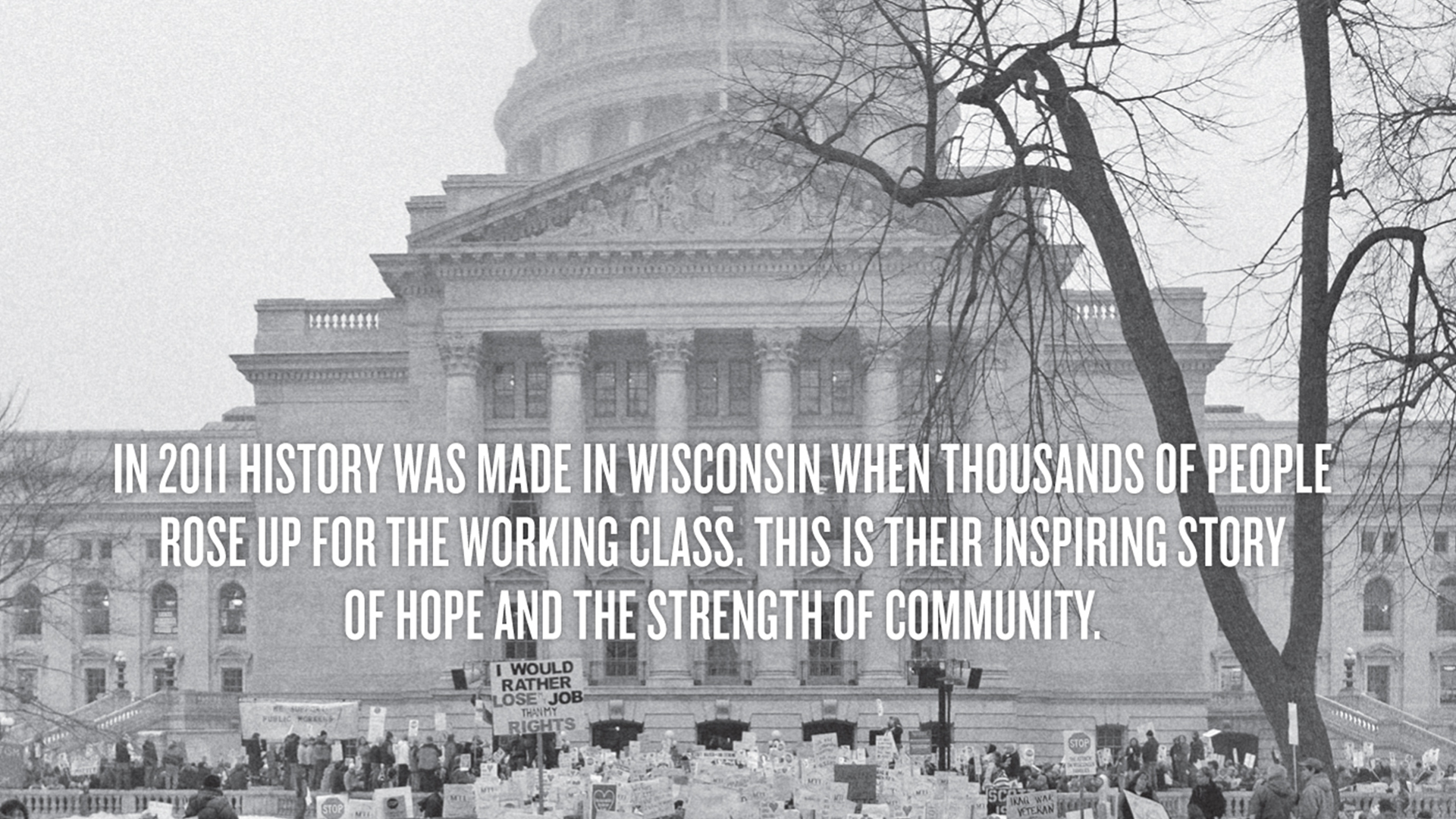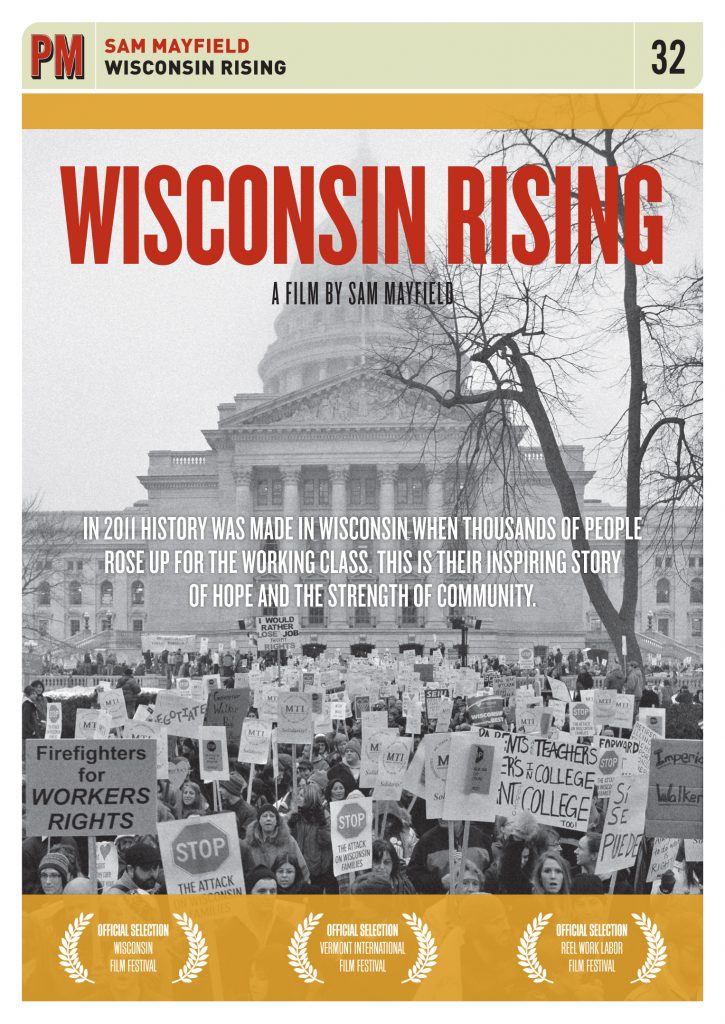By Ethan De Seife
Seven Days
October 16th, 2013
It was 2011, and Vermonter Sam Mayfield had only packed for a four-day stay when independent news outlet the UpTake hired her to shoot footage of the tumultuous scene at the Wisconsin State Capitol building in Madison. But as the protests against Gov. Scott Walker’s restrictive labor bill intensified, she extended her visit.
Ultimately, Mayfield stayed for seven months, capturing extraordinary footage that she would condense to create her documentary Wisconsin Rising. That film, a passionate and informative doc that wears both its heart and its politics on its sleeve, plays at the Vermont International Film Festival on October 20.
Wisconsin Rising is Mayfield’s second film, and her first of feature length.
For her first doc, the short “Silenced Voices” (2010), she and her crew traveled to Chiapas, Mexico, to return the remains of migrant farm worker José Obeth Santiz Cruz to his hometown. Cruz had been killed in a farming accident in Vermont in 2009, and the film gave Mayfield her first opportunity to use the medium of video to further her longtime commitment to social justice.
Mayfield, a 36-year-old Burlington video journalist, has been involved with grassroots political media of many kinds: print, radio, online, government-access television. Video, she says, “is the medium right now that makes sense to me … for wanting to tell stories about social justice issues.”
Wisconsin Rising brings together all manner of moving images — archival footage, computer graphics, original footage and interviews, news clips — to make a compelling case that Walker and certain Republican legislators committed a grave injustice against organized labor in their state. That injustice was all the more ironic given that Wisconsin was the first state to have granted public employees the right to bargain collectively.
“The nuances of the people who were there was one of the most amazing things,” Mayfield says of the protests. “These were people who were not political: farmers, teachers, nurses, not radical activists. Just hardworking Americans who were expressing themselves because an injustice was happening to them.” Wisconsin Rising touches on many of those people’s stories, showing how Wisconsin Act 10 affected schoolteachers, firemen, university students, legislators and others.
While most of the film’s screen time is given to the protesters and other opponents of the bill, a few Walker supporters make brief and unfavorable appearances. Refreshingly, Mayfield does not attempt to cloak her own political leanings by granting “equal time” to those on various sides of this complex issue. “I think if all sides were given a fair shake in the beginning, we probably wouldn’t have such injustices existing all over the country,” she suggests. “It’s not as though I didn’t try to have interviews with Republican senators or with Walker himself. All requests were declined, or phone calls were not returned.”
Mayfield refers often to what she sees as another kind of injustice: the corporate media’s monopoly on shaping Americans’ opinions about current events. “Our media system has a commercial structure,” she says. “People who can afford to have their point of view expressed get it expressed. There are a lot of points of view that don’t have dollars behind them, and they’re the ones that get left out.”
She did her research. The transcriptions of the interviews Mayfield conducted ran to 500 pages. The film itself was made on a small budget — $41,850 — and largely funded with a Kickstarter campaign. Mayfield shot the film mostly solo and received assistance, in the form of gifts of original footage, from other filmmakers whom she met in Madison. For every minute that remains in the film, she says, she discarded nearly 125 minutes of footage.
Mayfield’s documentary cost her more than money. She was arrested for disorderly conduct as she shot protest footage. “[The officer] was losing his temper. He was an example of resources being stretched too far,” Mayfield says, referring to the police’s maintenance of a constant presence during the occupation of the Capitol.
Though disorderly conduct is a civil charge, Mayfield’s case attracted the attention of a powerful criminal lawyer in Madison, Lester Pines, who has a standing interest in such cases. Having someone like Pines represent her, Mayfield says, “was like using a sledgehammer to put in a thumb tack.” The worst thing about her arrest, she adds wryly, was that it held up her production schedule. Footage of her arrest can be found on YouTube.
Wisconsin Rising, for all its excoriation of American political and media systems, is not without a sense of hope. Mayfield was inspired by the passion of the protesters, but she’s quick to say that if the people of Wisconsin — or any state — really want to ensure justice is served, they need to work outside the current political structure. Merely voting, she suggests, is not sufficient.
“It takes all kinds of actions to effect change,” Mayfield says. “People who want to see change in their communities need to be really well organized and really creative. One of the things they could do would be to make their own media.”
“Wisconsin Rising” plays on Sunday, October 20, at 4 p.m. as part of the Vermont Filmmakers’ Showcase No. 9 at the Vermont International Film Festival, Film House at Main Street Landing in Burlington. Free. vtiff.org







